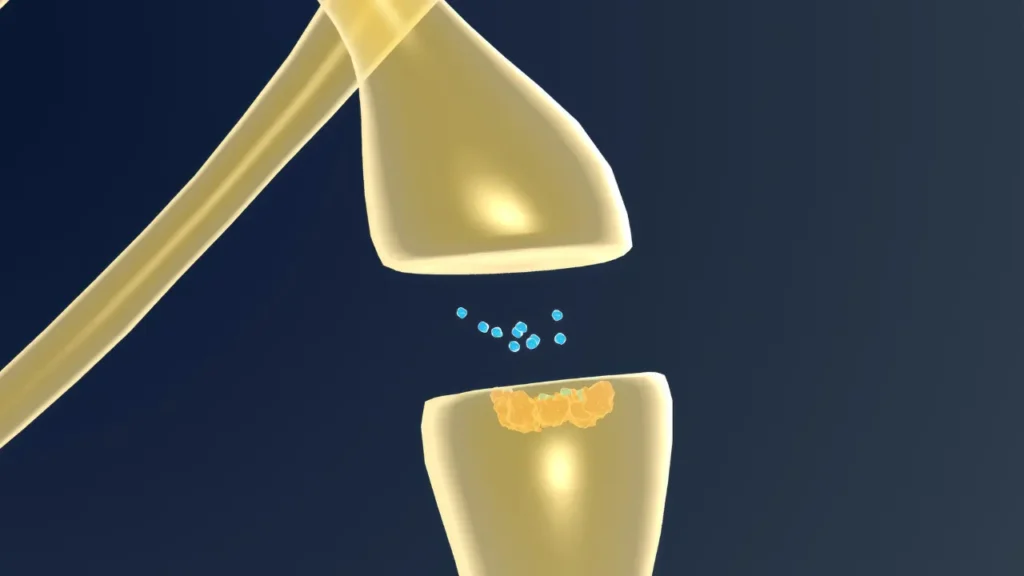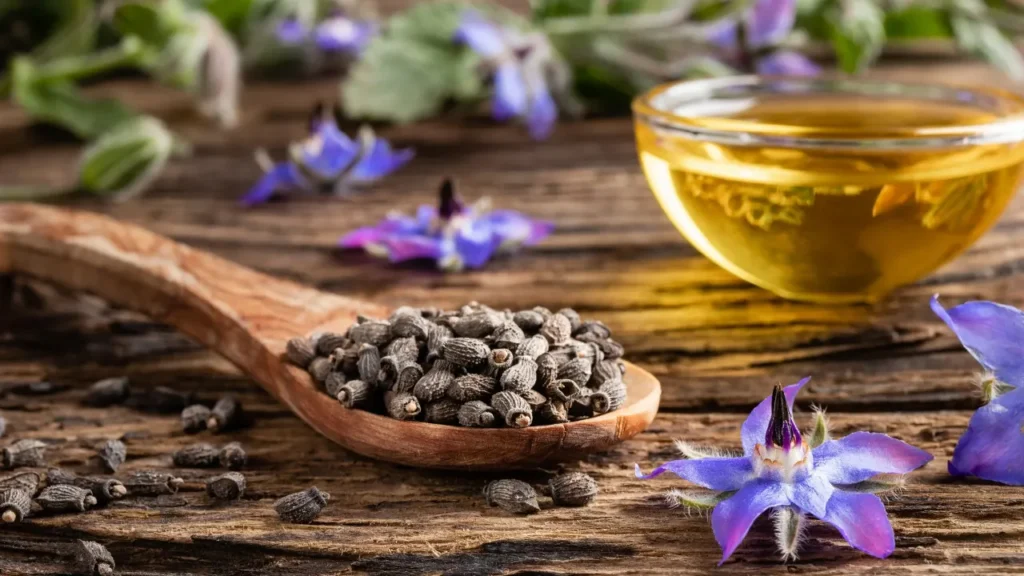The Mediterranean region’s natural annual plant, borage (Borago officinalis), often known as starflower, has been used for both culinary and medicinal purposes for centuries. The plant is distinguished by its hairy leaves, vivid blue or purple flowers, and peculiar taste that is similar to cucumber. The potential health benefits of boreage, which are linked to its rich phytochemical makeup, including gamma-linolenic acid (GLA), polyphenols, and flavonoids, have attracted increased interest in recent years. This piece intends to offer a thorough examination of the chemistry, health advantages, recommended dosage, negative effects, possible drug interactions, and ethical best practises related to the use of borage as a nutritional supplement.
You May Also Like:
Discover Your Brain’s True Potential: The Top Nootropics for Enhanced Cognitive Function and Focus
Borage: Benefits, Dosage, Side Effects, Drug Interactions, and Other Important Information is an original (NootropicsPlanet) article.
Nature of Borage
The Boraginaceae family includes the adaptable plant known as borage (Borago officinalis), which is distinguished by its distinctively hairy leaves, blue or purple star-shaped blooms, and cucumber-like flavour. It is an annual herbaceous plant with a normal height of up to 60 cm, preferring well-drained soil with full sun or light shade to develop.
For millennia, people have grown borage for its therapeutic, culinary, and aesthetic properties. All parts of the plant—leaves, blossoms, and seeds—are used, with the seeds serving as the main source of borage seed oil, which is a rich source of gamma-linolenic acid (GLA).
Health Benefits of Borage
Borage’s capacity to reduce inflammation has long been known. Borage seed oil’s GLA content is transformed into dihomo-gamma-linolenic acid (DGLA) and then PGE1, which has strong anti-inflammatory properties. Borage oil supplementation has been demonstrated in studies to lower the generation of pro-inflammatory cytokines and treat illnesses including rheumatoid arthritis and atopic dermatitis that are linked to inflammation.
According to research, borage oil may help the heart by regulating lipid metabolism and lowering inflammation. Borage oil has been proven to increase high-density lipoprotein (HDL) cholesterol while decreasing total cholesterol, low-density lipoprotein (LDL) cholesterol, and triglyceride levels. Additionally, GLA’s anti-inflammatory qualities as well as those of other phenolic compounds in borage may help delay the onset of atherosclerosis and lower the risk of cardiovascular disease.
Borage may have neuroprotective properties and enhance cognitive performance, according to emerging research. Borage extract has been demonstrated in animal models to lessen neuroinflammation, lessen oxidative stress, and enhance memory function. The activation of antioxidant and anti-inflammatory pathways as well as the manipulation of neurotransmitter systems, such as the glutamatergic and cholinergic systems, may be the underlying causes.

Chemistry of Borage
The wide variety of bioactive substances found in borage contribute to its pharmacological characteristics. The most notable of these is GLA, an omega-6 fatty acid that is present in borage seed oil in large quantities. Prostaglandin E1 (PGE1), a hormone-like compound that is essential for controlling inflammation, blood clotting, and blood vessel dilation, is a precursor of GLA.
The phenolic chemicals rosmarinic acid, caffeic acid, and other flavonoids like apigenin, luteolin, and quercetin are also abundant in borage. These substances have strong anti-inflammatory and antioxidant qualities that support the plant’s overall health-promoting benefits.
Physiological Mechanisms of Action
The numerous bioactive substances found in borage, which have a wide range of physiological effects on the human body, are responsible for the herb’s health advantages. The main mechanisms of action are altering inflammatory pathways and lipid metabolism, along with improving cognitive and neurological defenses.
Regulating inflammation is significantly aided by the GLA concentration of borage seed oil. Dihomo-gamma-linolenic acid (DGLA), which is metabolised from GLA to produce the anti-inflammatory prostaglandin E1 (PGE1), is then produced. PGE1 lessens inflammation by preventing the synthesis of pro-inflammatory cytokines such interleukin-1 (IL-1) and tumour necrosis factor-alpha (TNF-).
Numerous phenolic substances found in borage, such as rosmarinic acid, caffeic acid, and other flavonoids, have powerful antioxidant capabilities. These substances neutralise free radicals, reducing oxidative stress and the ensuing harm to DNA, proteins, and lipids—all important components of biological structures. Borage’s anti-inflammatory, neuroprotective, and cardioprotective properties are all influenced by its antioxidant activity.
By lowering total cholesterol, LDL cholesterol, and triglyceride levels while raising HDL cholesterol, borege oil has been demonstrated to have a favourable impact on lipid metabolism. The potential of GLA and other bioactive components in borage to influence the activity of enzymes involved in fat metabolism, such as lipoprotein lipase and hepatic lipase, may be the cause of these effects.
The antioxidant and anti-inflammatory properties of borage play a major role in mediating its neuroprotective and cognitive-improving effects. The phenolic components in borage lower oxidative stress and neuroinflammation, preventing damage and supporting the survival of neuronal cells.
Borage may also alter the action of neurotransmitter systems, including the glutamatergic and cholinergic systems, adding to its benefits for improving cognitive function. Borage is a helpful dietary supplement for a variety of health disorders thanks to these physiological methods of action, diversified chemical composition, and general health-promoting properties. To ensure the safety and effectiveness of borage, it is important to use it properly and in accordance with suggested dosages and instructions.


Optimal Dosage of Borage
The specific product and health condition being treated determine the ideal dosage of a borage supplement. In clinical investigations, the following dosages of borage seed oil, which is commonly standardized to contain 20-27% GLA, were employed:
- For rheumatoid arthritis, use 1.4–2.8 gm of borage seed oil daily for up to 24 weeks (equal to 280–560 mg of GLA).
- To treat atopic dermatitis, take 0.5 to 2 gm of borage seed oil daily for up to 12 weeks (equal to 100 to 400 mg of GLA).
The ideal dosage may differ depending on the ingredient, such as dried leaves or extracts, and should be chosen in accordance with the directions on the label or advice from a medical expert. It is important to remember that using borage or any other nutritional supplement for self-care should not take the place of traditional medical care. People with pre-existing medical illnesses or concerns should speak with their doctor before beginning supplementing.
Side Effects of Borage
Supplementing with borage is often regarded as safe when done so in moderation and over a brief time frame. However, some people may develop minor side effects like bloating, diarrhea, and gastrointestinal pain. Borage seed oil shouldn’t be put directly on irritated or broken skin because it could aggravate the condition.
Borage contains trace levels of pyrrolizidine alkaloids (PAs), which have been linked to both cancer and hepatotoxicity. Although the PA level in borage seed oil is often negligible, it is possible that other plant components such the leaves and flowers have higher PA content. Therefore, it is crucial to stick to suggested dosages and select high-quality borage products that have had their PA content checked.


Potential Substance Interactions with Borage
Certain drugs with borage may interact negatively or less effectively, resulting in side effects. The following are a few examples of possible drug interactions:
- Anticoagulants and antiplatelet drugs: Due to its potential blood-thinning effects, borage may increase the risk of bleeding when used with anticoagulants (such as warfarin) or antiplatelet medications (such as aspirin).
- Blood pressure-lowering drugs: Borage’s vasodilatory actions may increase the blood pressure-lowering effects of antihypertensive drugs, which could result in hypotension.
- Immunosuppressants: Because borage has immunomodulatory properties, it should be taken with caution in patients receiving immunosuppressive therapy because it may impair the effectiveness of immunosuppressive drugs (such cyclosporine).
Best Responsible Practices for Borage Supplementation
Think about the following best practices to maximize the advantages and reduce any hazards linked to consuming more borage:
- Pick high-quality products: Purchase borage supplements from recognized producers who follow good manufacturing practices (GMPs) and have had their products tested for pollutants like PA.
- Adhere to approved dosages: To discover the right dosage for your unique needs, consult a healthcare practitioner or stick to the dosages advised by the product’s manufacturer.
- Speak with a healthcare provider: To be sure that taking borage supplements is safe and appropriate for you, especially if you have any pre-existing illnesses or are taking medication, speak with a healthcare expert before you start.
Keep an eye out for any negative effects or unfavorable responses while taking borage supplements, and stop taking it if necessary.
Borage:
Conclusion
In the past 20 years, well over 125 million Americans have dealt with the effects of chronic health issues, many cases of which have been inflammation. Natural supplements like borage are great for those who have had trouble finding the right anti-inflammatory medication and wish to find relief in the meantime.
As mentioned before, borage is not a replacement for medication and should not be treated as such. But, in addition to other doctor-recommended vitamins and supplements, it can be a helpful addition to your health regimen. Topical borage creams are helpful as well and can be used for inflammatory skin conditions. With the right steps and over time, chronic inflammation can become a smaller part of your life instead of an overwhelming aspect of your general health.


References:
- The effects of dietary borage oil rich in gamma-linolenic acid on the metabolism of dihomo-gamma-linolenic acid in healthy human subjects: Retrieved from: https://academic.oup.com/ajcn/article/87/4/888/4633401
- found in borage, black currant, and evening primrose oils), leading to either the series 1 prostaglandins, which are anti-inflammatory, or to arachidonic acid (AA), which, via the COX-2 enzyme, becomes the highly inflammatory series 2 prostaglandins. link:https://www.sciencedirect.com/topics/medicine-and-dentistry/borage
Important Note: The information contained in this article is for general informational purposes only, and should not be construed as health or medical advice, nor is it intended to diagnose, prevent, treat, or cure any disease or health condition. Before embarking on any diet, fitness regimen, or program of nutritional supplementation, it is advisable to consult your healthcare professional in order to determine its safety and probable efficacy in terms of your individual state of health.
Regarding Nutritional Supplements Or Other Non-Prescription Health Products: If any nutritional supplements or other non-prescription health products are mentioned in the foregoing article, any claims or statements made about them have not been evaluated by the U.S. Food and Drug Administration, and such nutritional supplements or other health products are not intended to diagnose, treat, cure, or prevent any disease.
